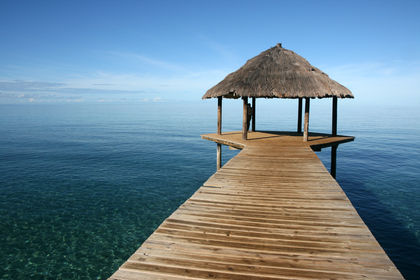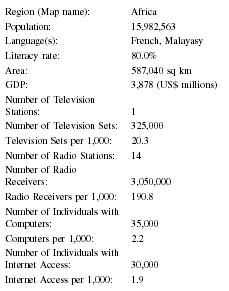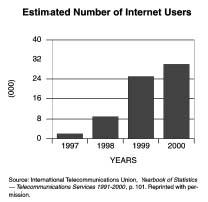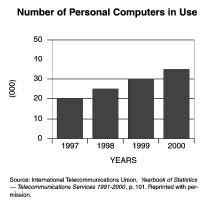Madagascar

Basic Data
| Official Country Name: | Republic of Madagascar |

| Region (Map name): | Africa |
| Population: | 15,982,563 |
| Language(s): | French, Malayasy |
| Literacy rate: | 80.0% |
| Area: | 587,040 sq km |
| GDP: | 3,878 (US$ millions) |
| Number of Television Stations: | 1 |
| Number of Television Sets: | 325,000 |
| Television Sets per 1,000: | 20.3 |
| Number of Radio Stations: | 14 |
| Number of Radio Receivers: | 3,050,000 |
| Radio Receivers per 1,000: | 190.8 |
| Number of Individuals with Computers: | 35,000 |
| Computers per 1,000: | 2.2 |
| Number of Individuals with Internet Access: | 30,000 |
| Internet Access per 1,000: | 1.9 |
Located in the Indian Ocean east of southern Africa, Madagascar, the fourth largest island on earth, is known for its unique mammals, birds, and plants. Many of the 15 million Malagasy people are descendants of Africans and Indonesians.
An astonishing and little known fact of Madagascar's history involves the pre-Holocaust suggestion by Hitler's henchmen Hermann Goring in 1938 and Heinrich Himmler in 1940, that 4 million European Jews be forcibly emigrated to this distant and remote island. After the war, Madagascar gained independence from French colonialism (1960) and since then has had a checkered political situation with a series of military and civilian rulers.
Although Malagasy is the official language, French is most often spoken and written. An average of 88 percent of Madagascar's males and 73 percent of its females over the age of 15 can read and write. The major religions of Madagascar are indigenous beliefs (52 percent), Christianity (41 percent), and Muslim (7 percent). Widespread poverty in Madagascar reduces life expectancy to the mid-50s.
The major daily newspapers in Madagascar include Midi-Madagasikara, The Madagascar Tribune, and L'Express, all privately owned, written mainly in French and circulated from the capital, Antananarivo. Gazetiko, written in Malagasy, is also printed in Antananarivo. Maresaka, Basy-Vava, Imongo, and Vaovao are also published daily.

Weekly newspapers include the French Dans Les Medias Domains (In the Media Tomorrow), which has a large circulation in outlying areas while Lakroa N'Y Madagasikara, written mostly in Malagasy, is a Roman Catholic weekly which also reaches remote areas. Feon'ny Merina (Voice of the Merina) is a weekly newspaper in Malagasy and is directed at Merina people of Malay origin.
Monthly newsmagazines include the French Revue de l'Ocean Indien, which contains information and analysis relevant to the people of the Indian Ocean area. Political, legal and economic issues are covered monthly in the mostly French Jureco while every three months, Madagascar Magazine, entirely in French, deals with economic, commercial and cultural issues. Appearing every three months, Vintsy Magazine (two-thirds in Malagasy, one-third in French) deals with ecological issues while Antsa (half in Malagasy, half in French) is dedicated to artists and culture.
Madagascar's economy is primarily agricultural with some textile manufacturing and agricultural products processing. Economic growth and per capita incomes have sharply declined since the 1970s partly due to the government's lack of commitment. Persistent malnutrition and poorly funded education and health care are ongoing concerns.
Theoretically, press law is founded upon Article Ten of Madagascar's Constitution: "Freedom of opinion and expression, communication…and conscience shall be guaranteed to all and may be limited only in respect of the rights and liberties of others and…to safeguard public order." More specifically, Article Eleven assures, "Information in all forms shall be subject to no prior restraint…[however] conditions of freedom of information and its responsibility shall be determined by law and by codes of professional ethics."
In practice, human rights organizations point out that Madagascar's government has been known sometimes to pressure media personnel to avoid coverage of issues contrary to the government's interests. Likewise, politicians opposed to the ruling regime are denied access to state-run media. Journalists are strongly encouraged to practice "self-censorship."
In the late 1990s, the frequency and seriousness of censorship incidents increased in Madagascar. In 1998 the editor-in-chief of L'Express and a reporter were sentenced to three months in prison for contempt of court.
In 2000 a journalist was threatened with dismissal for his reports about government censorship of opposition politicians. Another journalist publicly disagreed with a local government official and was physically attacked by him. A radio reporter, beaten by a government official, was sentenced to prison for broadcasting negative information about the official. One journalist asserted that politicians use physical violence and intimidation rather than the courts to redress their grievances against journalists.
In 2001 journalists insisted that a member of the legislature's opposition party who was imprisoned for six months on an allegedly trumped up charge was really punished for criticizing the President. While reporting on government opposition rallies in early 2002, an editorial in the Midi Madagasikara urged the government not to "shoot the messenger" that reports the news and implored the public to fight for free media.
In the area of broadcast media, Madagascar has three main TV stations: RTM, Radio-Television Malagasy, state owned; RTA, Radio-Television Analamanga, privately owned; and MATV, Madagascar TV, privately owned. RTA and MATV broadcast mostly to Antananarivo and its nearby areas.
Radio news is broadcast from privately owned FM stations such as Radio Lazan Iarivo (Glory of Iarivo), Radio Korail, and Radio Antsiva; all three are based in Antananarivo. RNM (Malagasy National Radio) is state owned. Radio Don Bosco, a Catholic FM station, operates only in the capital area. Radio Feon'ny Merina, privately owned, targets Merina people of Malay origin, while Radio Tsioka Vao, privately owned, is known to be pro-government. In total the government owns 17 AM and three FM stations. In 2002 the news media exhorted the public to be aware that many radio journalists are forced to articulate a pro-government point of view.
The electronic media in Madagascar is disproportionately sophisticated in that each daily newspaper is

In the years to come, the uncomfortable relationship between Madagascar's unstable and volatile political situation and its independent journalists will define the extent to which vibrancy, openness, and fairness will characterize Madagascar's print, electronic, and broadcast media.
Bibliography
"Africa Countries: Madagascar," 2002. Available from http://www-sul.stanford.edu/depts/ssrg/africa/madag.html .
"Madagascar." CIA: The World Factbook, 2002. Available from http://www.cia.gov .
"Madagascar." World Press Freedom Review, 2002. Available from http://freemedia.at/wpfr/madagas.htm .
Howard A. Kerner
Comment about this article, ask questions, or add new information about this topic: